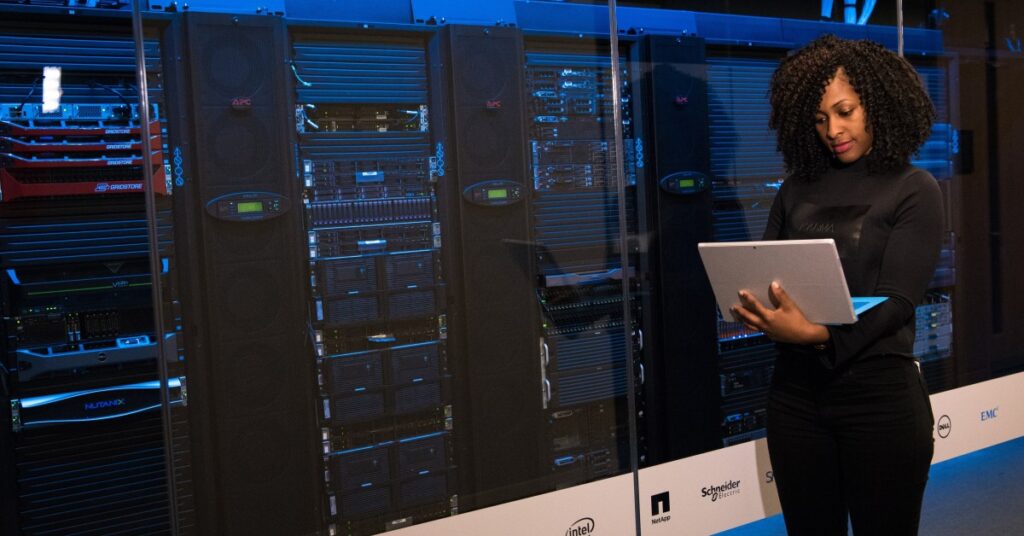
Getting an Online Master's in Computer Science: Does Location Matter?
Online learning enables you to attend degree programs anywhere in [...]

While the boom in the data science field has been going on for years, it continues to expand, offering enormous opportunities for people with the right combination of education and expertise. A recent article in Forbes details how data science salaries are increasing despite the effects of the ongoing COVID-19 pandemic. Well-educated, experienced data science professionals typically earn well over $100,000 in base salary, and can often perform their work remotely from anywhere in the world. Should you choose to pursue it, a career in data science can be very rewarding.
While the data science field may seem like a modern gold rush, companies often struggle to hire qualified professionals, as data science can be challenging and many people in this profession don’t have enough education to qualify for top roles. According to a micro-business owner in an article on ZDNet, “We need people coming through the university system to learn from first principles how to create deep learning, neural network systems, rather than relying on off-the-shelf systems that are available through the big US companies.” While this piece focuses on European employers, companies in the United States are contending with the same issues.
Top data science professionals can solve problems with their original work—but how do you acquire those skills? Can they be learned in a master’s in data science program? Or do you need to acquire an even more difficult and time-consuming PhD? This article addresses an essential question for anyone pursuing a career in data science: is a master’s enough, or do I need a PhD?. It also covers:
A PhD in data science can be beneficial, no doubt. Professionals with this degree often have the first pick of jobs and earn more than those with a master’s degree. It’s also a popular degree for those working in data science. A 2021 Burtch Works study found that 48 percent of data science professionals hold a PhD, a five percent increase from 2020.
However, a PhD in data science is not necessary to succeed. Many professionals in this field hold a master’s degree and earn competitive salaries. One can even work in data science without a master’s, though it’s extremely difficult. You’ll need to prove yourself very thoroughly by showcasing excellent projects on open source software platforms like Github and completing certifications. Yet, even then, it’s very hard to get noticed.
The return on investment of a data science master’s can be significant, though it depends on a few factors. First, you need to consider the cost of your degree program. Top schools can easily charge over $100,000 for a master’s, while the tuition at more affordable universities—including those offering online programs—may be a more palatable $40,000 or $50,000. Nevertheless, paying for this degree can be a substantial burden, especially if you take two years off to study, losing income and time spent gaining additional professional experience in the process. However, enrolling in a part-time online program that allows you to work while you take your classes is an attractive and feasible option for many people seeking to earn this degree.
Though they may be more expensive to obtain, a degree from a top school has its advantages. Top programs usually offer great connections and alumni networks, potentially giving you access to better jobs (though these benefits also can be found at many less-costly programs). They also may provide a greater number of course offerings, which can lead to additional career opportunities. Southern Methodist University’s website touches on this while making the case for the ROI for their computer science program, a popular degree path for data scientists: “More expensive programs are more likely to offer high-value specializations and more opportunities to customize the computer science curriculum.”
Suppose you’re able to secure a job upon graduation that pays over $100,000 a year. The price tag of your program looks less significant, particularly if utilizing the school’s network helped you secure the interview (and if you graduated from a less-pricey program, you’ll be in a position to pay off any student loans more quickly). When calculating the ROI of your degree, it’s helpful to think of the long-term benefits rather than short-term costs. Even if it takes you a few more years to pay off a top program, it may be worth it if your career earnings are higher.
Lastly, even if you’re vaguely entertaining the thought of going after a PhD in data science, you’ll need to obtain your master’s first. So, it may be wise to secure your master’s, go out in the world and work for a while, and then see whether your career progresses to the point where a PhD is necessary to advance—and you want to pursue it.
A data science master’s can help you earn leading jobs at start-ups, large companies like Amazon, IBM, and Microsoft, as well as government agencies. According to PayScale, current, top master’s-level job salaries are:
| University and Program Name | Learn More |
|
Boston College:
Master of Science in Applied Analytics
|
|
|
Merrimack College:
Master of Science in Data Science
|
Typically, master’s programs in data science take two years to complete, but can range from one (accelerated programs) to around five years (part-time programs). Data science is a complex subject and these programs are not designed for novices. Many set proficiency requirements that applicants need to meet, in addition to submitting traditional admissions materials like bachelor’s degree transcripts, resumes, and test scores. The University of Washington–Seattle Campus requires that applicants take courses in math and programming. They must complete or prove equivalency of:
Alternatively, applicants can “demonstrate programming skills through substantial practical experience with Python, Java, JavaScript, C#, or C++” beyond using programming software tools like MATLAB and SQL.
The University of Virginia accepts students with non-computer science backgrounds, including history, economics, and hospitality management. However, the school requires incoming students to complete pre-program summer courses in:
Other programs, such as the one at Tufts University, do not have strict prerequisites, sticking closer to traditional application requirements. Many programs, especially those offered online, are becoming test-optional.
You may be able to be admitted into a data science program without having advanced knowledge, but it’s not always beneficial. If you need to enroll in classes to catch up on fundamental data analysis, computer programming, data mining, and data visualization skills, you may not be able to take advantage of high-level data science courses that may make you more appealing to prospective employers and eligible for more advanced positions.
The average data science program has a wide-ranging curriculum that can include coursework on:
Most of these subjects are useful across a broad spectrum of data science jobs. For instance, data analysts likely know data processing techniques before entering a master’s program. Good master’s programs teach you the techniques for creating data collection methods, rather than relying on existing methodology. They also focus on data science projects that can position you to have better decision-making and problem-solving know-how upon graduation—and often include a capstone project as a requirement to graduate.
Many data science programs allow students to specialize in their coursework, which can help lead to top jobs in the industry with commensurate higher pay. Common data science specializations include:
You can study artificial intelligence as part of a data science program, including at top universities like University of Pennsylvania. You can also complete a specialized master’s in AI; Drexel University offers a Master of Science in Machine Learning and Artificial Intelligence. AI is a common data science tool that can help data scientists decipher large quantities of data and spot trends.
Projections indicate that by 2025 humanity will generate 463 exabytes of data every day. Expectations for the amount of information that data scientists need to parce are growing, and most master’s programs address big data in one fashion or another.
According to Burtch Works, the number of analytics professionals working in healthcare has tripled from 2016 to 2021, even as sectors like finance and advertising experienced a decrease. Bioinformatics professionals use data to examine diseases and genetic code to try and find cures and improve healthcare outcomes. You may complete bioinformatics coursework as part of a data science program, but many schools offer bioinformatics master’s programs.
Computational finance is the application of mathematical and statistical principles to finance. You may complete this specialization as a unique degree, though a computer science background is useful. Programs like the one at Georgia Institute of Technology, which is STEM-designated, require programming and advanced mathematical modeling skills.
Cyber security is the application of computer science principles to cyber defense techniques. Cyber security professionals work in both the private and public sectors to prevent and respond to cyber attacks. It’s easier to specialize in cyber security in a computer science program than a data science master’s (though it’s possible). In reality, if you have experience in computer or data science and know you want to pursue cyber security, you should consider one of the many excellent
cyber security master’s programs.
According to Search Data Management, a “data engineer is an IT worker whose primary job is to prepare data for analytical or operational uses.” They specialize in areas like transportation and storage, and need excellent warehousing skills. They work closely with data scientists and frequently earn a master’s in data science or data engineering.
Most data science master’s programs cover data modeling; it’s a skill you typically develop before a master’s as a data analyst. Many bootcamps and certificates also cover this subject, but it’s more of a necessary skill than a specialty. Data professionals use modeling in conjunction with other tools to improve decision making and communication.
Stevens Institute of Technology, alongside many other top programs, includes machine learning as part of its curriculum. It’s also a popular specialization—or even a unique master’s. Professionals with good machine learning skills can build tools to collect and analyze data and land top data science jobs.
There is no single best master’s in data science program, and the right one for you can depend on non-academic factors. Working professionals typically prefer online courses because they offer flexibility—many programs are not full-time. Still, there are a few schools known for being exceptionally high-quality. Upper echelon data science programs can be found at:
Questions or feedback? Email editor@noodle.com

Online learning enables you to attend degree programs anywhere in [...]

You know all the obvious reasons to earn a master's [...]
Categorized as: Data Science, Information Technology & Engineering